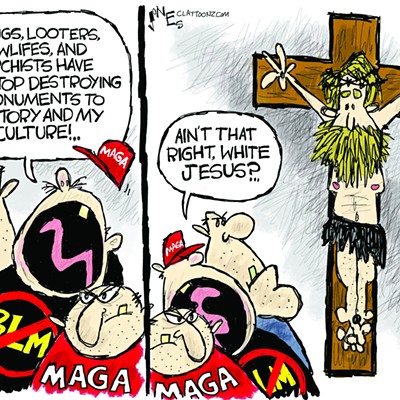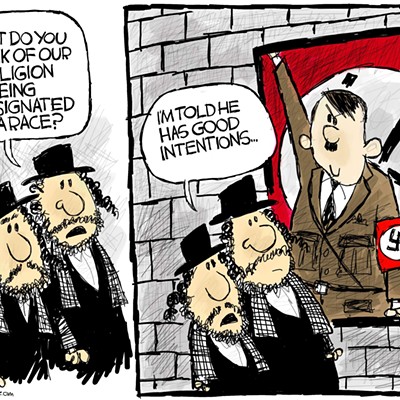The bishop, very controversial within the Roman Catholic Church, had been bounced from the Detroit Archdiocese for his progressive views. Now he was bound for Tucson, to raise a little stink over the church's lousy treatment of gays.
He never made it.
Tucson Bishop Gerald Kicanas denied permission for Gumbleton's visit, purportedly because Gumbleton was invited by Call to Action, a lay group hoping to drag Roman Catholicism beyond the Dark Ages, and retrieve its church from the fierce grip of morally confounded white men.
Call to Action opposes the Vatican on endless issues, including the Vatican's opposition to inclusion of gays and lesbians, and to ordaining women priests and allowing priests to marry.
And that's a windy way of explaining why Bennett Burke is actually Bishop Bennett Burke, of the Liberal Catholic Church. He's among a growing number of former Roman Catholics who've found a refreshing alternative to that institution's smothered evolution.
Called breakaway churches, these congregations are every bit as Catholic as their Roman counterparts. And bishops such as Burke, a corporate executive by trade, are every bit as official as Bishop Kicanas, tracing their succession back to the apostles.
But there are also striking differences. For one, the breakaway churches aren't notoriously riddled with sex offenders. For another, they believe women should play a role equal to men, including being ordained as priests. These churches don't turn gays away, and they don't impose celibacy on their clergy; Burke is happily married with a grown daughter.
And finally, breakaway churches seem more concerned with the spiritual than the temporal. As such, they can devote creative energy to religion, rather than to fighting lawsuits and hoarding wealth. "I've been ordained in the Liberal Catholic Church for over a decade and never taken a dime," says Burke. "I don't even get mileage for my vehicle."
To a growing number of disaffected Catholics, these alternative churches are becoming the preferred alternative. Burke started his first congregation in Casa Grande a decade ago. Today, that church boasts 200 members, including many who joined after the Roman Catholic Church refused to baptize their babies.
Today, Burke is seeding another congregation in Tucson, called Our Lady of Peace and Hope.
Nationwide, the Liberal Catholic Church now has approximately 8,000 members. And like Bishop Burke, most are refugees from Roman Catholicism.
He recalls raising plenty of questions as a kid. "I was always being told, 'It's a mystery; you just have to take that on faith,'" he says. "I just didn't feel I was getting answers."
And rampant bigotry was de rigueur. "There were people within my church who were not fully welcomed for a variety of reasons. I felt that if there were people who were marginalized ... I'd rather stand with them, outside the church." And so he spent the next 20 years as an atheist.
He later sampled several Protestant churches, but they were never a good fit. "In my adulthood, I realized something about me was still Catholic. But I didn't feel I could practice my faith in the Roman Church with all its rules. Through a series of experiences and readings, it became apparent to me that there were other ways to be Catholic."
Delores Kropf couldn't agree more. She'd spent years knee-deep in the Seattle Archdiocese. She boasts a degree in pastoral counseling from the University of Portland, and served on the pastoral council under then-Seattle Archbishop Raymond Hunthausen. Like Gumbleton, Hunthausen ranked among the most progressive of American bishops (and not coincidentally, became the target of Vatican doctrinal enforcer Joseph Ratzinger, now better known as Pope Benedict XVI).
Then Kropf hit turbulence. "I had conflict with many of the church's teachings and they had some conflict with me," she says. "I became divorced and found out I was also gay, so then they really had a problem with me. But I also had a lot of problems with the birth control issue, women's issues and the church hierarchy."
She arrived in Tucson with her partner in 1992, "and we did Catholic church shopping. We didn't even tell people we were gay. But because of our belief systems and the way the church was, we decided we just couldn't go there anymore."
That's when a friend mentioned the Diocese of Ecumenical Catholic Communion. Headquartered in Aurora, Colo., the church boasts congregations in nearly a dozen states, including several in California.
"All those things we had problems with before ... they weren't a problem in this Catholic church," Kropf says. Eighteen months later she was ordained as the ECC's first Tucson priest. Now she heads the small St. Michael's Ecumenical Catholic Church, which rents space in a First Christian Church.
Her congregation may lack bricks and mortar, but they boast a big welcome mat, says the Rev. Kropf. "We're the only gays in the church. But we have many people who have been disillusioned or hurt by the Roman Catholic church in one way or another. Some of them came during the sex scandal. They said enough was enough."
Others are driven out by the Vatican's self-serving Biblical interpretations, which they claim simply justify backwardness and discrimination.
In an earlier interview with the Tucson Weekly, Bishop Kicanas denied any such intention. "Clearly the church is not desirous to push anyone away," he said. "But the church has to be faithful to its teaching."
How far does that faith go? Just examine the flurry over Proposition 107 in the last election. The measure, thoroughly thumped by voters, aimed to ban government recognition of unmarried domestic couples. However, most people recognized that as code for gay couples.
Bishop Kicanas and his Phoenix counterpart very publicly supported the measure. But Bishop Burke wrote a guest editorial in the Tucson Citizen denouncing it.
"We all live in a social context," Burke says. "All of us interpret the Bible through our experiences, our biases and prejudices. And our interpretation is that some of those messages in the Bible appearing to condemn relationships between members of the same sex in fact are not what they seem to be. Instead, we believe those messages are trumped by Christ's message of loving everyone. It's simple as that."
Rather than Biblical inscriptions, the Rev. Kopf sees fallible men behind the Vatican's stance. "I believe it's about power protection." she says. "Throughout 2,000 years, there have been changes and new understandings. As we learn more, we also learn that church doctrine isn't always quite in line with that. Galileo was a perfect example. The (church) has just gotten around to saying that he might have been right."












